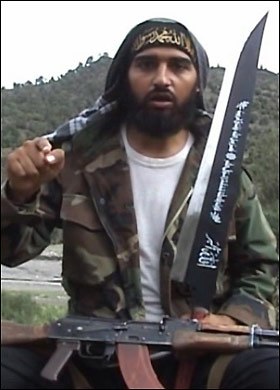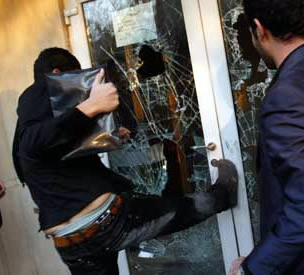by Kirill Semenov
[REGNUM] In response to the Israeli attacks on Iran on June 13, the Islamic world demonstrated a rare degree of diplomatic consolidation.
| Verbally, anyway. Mustaches were cursed, shoes thrown en masse. Beyond that, they haven’t stopped Israel from flying through their airspace on the way to flattening hundreds more key buildings somewhere in Iran. |

The collective document qualified Israel's actions as a gross violation of Iran's sovereignty and international law, especially given the targeted strikes on nuclear facilities under IAEA safeguards.
The signatories unanimously warned that such actions create an extremely dangerous precedent, threaten the stability of the entire Middle East and jeopardize the safety of shipping in the Strait of Hormuz, which is critical to the global economy and through which a third of global oil supplies pass.
GULF STATES UNDER THREAT
The current conflict is of particular concern to the Gulf states, which are watching with growing alarm the prospect of further escalation and expansion of the confrontation between Israel and Iran.
In recent days, the member states of the Gulf Cooperation Council (GCC) have made their position very clear: they categorically do not want to be drawn into a large-scale armed conflict that they did not provoke and do not seek.
This position is not dictated by abstract concerns.
The presence of major US military bases and vital strategic infrastructure, including oil terminals, ports and logistics hubs on their territory, makes the Gulf states potential targets if the Donald Trump administration joins Israel's actions.
The leaders of the Arab monarchies understand that escalation could spread quickly to their own cities, jeopardizing not only the safety of their populations, but also the very foundations of their economies, which are deeply integrated into global energy supply chains.
Against this backdrop, discontent is growing in Arab capitals with Trump’s approach to current events, his de facto support for Israeli aggression, and even plans to join it. For the GCC states, this essentially means the US abandoning its own promises to prevent regional escalation – assurances Trump gave to Arab leaders during his May visit to the Gulf states.
Now, Israel's actions and the US administration's failure to contain Netanyahu do not guarantee the GCC countries' security even if they maintain consistent neutrality.
Israeli air force attacks on Iranian nuclear infrastructure raise concerns about potential expansion of strike targets. The Gulf littoral states' main nightmare is a strike on Iran's Bushehr nuclear power plant.
The location of this facility just three hundred kilometers from the coast of Arabia makes the scenario of radioactive contamination catastrophically real. A release of radiation into the Persian Gulf would have immediate and long-term devastating consequences.
Radioactive contamination will inevitably affect the desalination plants from which the Gulf countries receive the bulk of their drinking water, creating a direct threat to the livelihoods of millions of people.
Water contamination will destroy fish stocks and cause irreparable damage to aquaculture, undermining an important economic sector and food security. The consequences for the unique marine ecosystem of the Persian Gulf will be irreversible.
In light of these risks, the message from the Gulf monarchies is extremely pragmatic and urgent.
They call for the need to contain the escalation of the conflict between Israel and Iran at all costs and to protect the critical energy flows from the Persian Gulf, the stability of which is vital for the global economy. It is fundamentally important for them to prevent the involvement of other regional players in the conflict, but above all the United States, which would inevitably turn a local confrontation into a regional and even global conflagration.
Whether Washington and Tel Aviv respond to this call will be the decisive factor in determining the region's prospects.
At stake is a test of the fundamental strategy that monarchies have pursued in recent years - hedging, balancing between global powers, economic diversification and attempts to reduce dependence on oil.
Will these carefully constructed buffers and alternatives be able to withstand the onslaught of a full-scale regional war, or will the entire strategic project collapse in the chaos of a large-scale conflict, setting the region back decades?
The answer depends largely on the ability of the international community to hear and respond to the alarm bells coming from the Gulf. But it is clear that grandiose transformation programs like Saudi Arabia’s Vision 2030 are now under renewed threat.
In fact, Saudi Arabia was forced to make peace with the Houthis precisely because of the stalled implementation of this program, which requires “greenhouse conditions,” and any security challenges put it at risk.
Now, however, a new war, started without any participation from Riyadh, is proving even more destructive for the country's modernization projects.
It is obvious that if the US is drawn into the conflict, Iran's missile salvoes against US bases in the Gulf countries will set their programs back many years, and they will lose their investment appeal for many years. And it is not worth thinking that all Iranian missiles will end up in Israel.
The Islamic Republic has only used medium-range missiles that can reach the Jewish state for retaliatory strikes, while its vast stockpiles of tactical missiles have not been used. But they could be used if Trump decides to join Netanyahu.
Thus, the consequences of the June 13 attacks create serious systemic risks for the region, and possible US intervention will push Tehran to an asymmetric response that could also destabilize Lebanon and Iraq, where Iranian influence remains.
Even if Washington does not join the Israeli attacks, the US passivity in containing Israel and Donald Trump's indirect support for it are damaging American plans for the Gulf Arab monarchies, forcing them to continue to distance themselves from the Abraham Accords.
The economic threat is existential for them: a potential closure of the Strait of Hormuz by Iran would paralyze the oil exports of the Gulf countries, whose budgets are critically dependent on energy revenues.
The deaths of prominent nuclear scientists such as Abdolhamid Minouchehr can only accelerate Iran's development of nuclear weapons in underground complexes like Fordo, creating a new source of global instability and forcing Arab countries to rethink their security strategies.
CONFLICTING CONVICTIONS
Türkiye has seemingly taken the most radical position, openly calling for sanctions against Israel and essentially supporting Iran's military response as a right to self-defense.
“Iran’s right to defend itself against banditry and state terrorism from Israel is completely natural, legitimate and legally justified,” Turkish President Recep Tayyip Erdogan said at a meeting of the parliamentary faction of the ruling Justice and Development Party.
At the same time, the territory of the Turkish Republic can still be used by US and NATO aircraft to collect intelligence information in the interests of Israel.
In turn, the State of Qatar insists on an immediate international investigation into Israel's actions under the auspices of the UN, expressing direct solidarity with the victims of the attacks in Iran.
Saudi Arabia, despite its historic rivalry with Tehran, has suddenly issued a strong condemnation, using the rhetoric of the “Muslim Brotherhood” and criticizing the West’s “double standards,” in a desperate attempt to prevent a chain escalation that could derail the kingdom’s economic diversification plans.
Pakistan also supported this line, calling Israel's actions aggression, a challenge to all Muslims and demanding collective measures of defense.
"Israel has set its sights on Yemen, Iran and Palestine. If the Islamic world does not unite now, we will all face the same fate," Pakistani Defense Minister Khawaja Asif said. And Pakistani Prime Minister Shehbaz Sharif spoke by phone with Iranian President Masoud Pezeshkian and assured him of unwavering support.
In contrast, the UAE and Egypt have shown noticeable restraint.
Abu Dhabi has called for dialogue to “prevent the conflict from widening,” while Cairo has offered to act as a mediator to resume talks on the nuclear deal, indirectly acknowledging ongoing concerns about Iran’s nuclear program.
Indonesia and Morocco have joined the OIC's general rhetoric but avoided making specific commitments, demonstrating caution in the face of geopolitical turbulence.
Oman, which traditionally acts as a regional peacemaker, took a special position.
Sultan Haitham bin Tarek Al Said called on both sides in a telephone conversation with Pezeshkian to exercise "maximum restraint and immediately return to the negotiation process," warning of the catastrophic humanitarian and economic consequences of an escalation for the entire region.
He reiterated Muscat's readiness to open its diplomatic channels for de-escalation, recalling Oman's historic role in mediating between Iran and the US, including talks disrupted by the June 15 attacks.
However, the Grand Mufti of Oman, Ahmad al-Khalili, took a tougher stance: “We were stunned and shocked by the aggression of the Zionist entity against Iran. Despite this, we believe and are confident that Allah Almighty will defeat them [Israel] and will do so through the hands of the Iranian armed forces – something that the souls of believers aspire to.”
And in the next message, Al-Khalili said: “The Iranian response to the Zionist aggression was firm and decisive, calming hearts after it achieved results. It opened the door to hope that the hated Zionist occupation of the Holy Lands will end irrevocably, if God allows.”
SIGNIFICANT DIFFERENCES
At the same time, deep fault lines within Islamic solidarity became apparent in the first hours after the attacks.
Not a single country, including Israel's most vocal critics – Turkey, Qatar and Pakistan – has offered Iran real military support, limiting itself to rhetoric and diplomatic demarches.
Despite the fact that there are American military facilities on the territory of these countries that could be used against Iran, and may already be used for intelligence purposes.
Significant differences also emerged in the interpretation of the nuclear issue.
While Saudi Arabia and Egypt have been insistent on the need to control Iran's nuclear program, Pakistan and Qatar have deliberately ignored the issue, focusing exclusively on "Israeli aggression."
The neutrality of Algeria, Morocco and Malaysia, which abstained from signing the joint statement, once again confirmed the caution of many Muslim countries, who are not ready to sacrifice relations with the West for the sake of demonstrating unity.
It is significant that Algeria, previously Israel's most consistent opponent and Iran's close Arab partner, expressed its position only after the country's Foreign Minister Ahmed Attaf took a phone call from Iranian Foreign Minister Abbas Araqchi.
"Foreign Minister Ahmed Attaf reiterated Algeria's unwavering position, which, while condemning Israel's aggression, stresses the need for the UN Security Council to assume responsibility for ensuring compliance with international law and the principles of the UN Charter in order to stop Israeli attacks," the official statement said.
Thus, the Islamic world's reaction to the Israeli-Iranian standoff reflects the paradox of tactical unity amid strategic fault lines.
Condemnation of Israel, based on principles of sovereignty and fear of a regional conflagration, has allowed for temporary consolidation. However, unresolved contradictions – from the age-old Sunni-Shiite rivalry to fundamentally different approaches to relations with the US and assessment of the Iranian nuclear threat – block the transition to real collective action.
Oman's position, balancing between solidarity with Iran and pragmatic mediation, serves as a clear illustration of this duality.
The June 13 attacks have fueled anti-Israel rhetoric, but they have not addressed the underlying conflicts that make the “Muslim consensus” extremely fragile.
However, further escalation could reformat the entire system of regional alliances, pushing even moderate regimes into confrontation with Israel and its allies, which threatens the Middle East with destabilization on an unprecedented scale.

 ...a kingdom taking up the bulk of the Arabian peninsula, largely made up of sand and oil rigs. Its primary economic activity involves exporting oil and soaking Islamic rubes on the annual haj pilgrimage. The country supports a large number of princes in whatcha might call princely splendor. Formerly dictatorial and steeped in Olde Tyme Religion, deferring to Salafist holy men on all issues, it has now done a 180 and is making a serious effort to modernize, so as not to be left in the sand by its Gulf Arab neighbors. The holy men have been shoved to the background and the nation is now still dictatorial but somewhat rational. That doesn't make them trustworthy, but it's a start...
...a kingdom taking up the bulk of the Arabian peninsula, largely made up of sand and oil rigs. Its primary economic activity involves exporting oil and soaking Islamic rubes on the annual haj pilgrimage. The country supports a large number of princes in whatcha might call princely splendor. Formerly dictatorial and steeped in Olde Tyme Religion, deferring to Salafist holy men on all issues, it has now done a 180 and is making a serious effort to modernize, so as not to be left in the sand by its Gulf Arab neighbors. The holy men have been shoved to the background and the nation is now still dictatorial but somewhat rational. That doesn't make them trustworthy, but it's a start... ..not a terrorist organization, even though it kidnaps people, holds hostages, and tries to negotiate by executing them,...
..not a terrorist organization, even though it kidnaps people, holds hostages, and tries to negotiate by executing them,... [TabletMag] Yesterday, President Donald Trump single-handedly collapsed the most destructive idea of the last hundred years—Palestine. During meetings with Israeli Prime Minister Benjamin Netanyahu and other Israeli officials, Trump said he was going to move 1.7 million Palestinians out of Gaza. And just like that, he broke the long spell that had captured generations of world leaders, peace activists, and Middle East terror masters alike, who had paradoxically come to regard the repeated failure and haunting secondary consequences of the idea of joint Arab Muslim and Jewish statehood in the same small piece of land as proof of its necessity.
[TabletMag] Yesterday, President Donald Trump single-handedly collapsed the most destructive idea of the last hundred years—Palestine. During meetings with Israeli Prime Minister Benjamin Netanyahu and other Israeli officials, Trump said he was going to move 1.7 million Palestinians out of Gaza. And just like that, he broke the long spell that had captured generations of world leaders, peace activists, and Middle East terror masters alike, who had paradoxically come to regard the repeated failure and haunting secondary consequences of the idea of joint Arab Muslim and Jewish statehood in the same small piece of land as proof of its necessity.
 ...the irrational fear that Moslems will act the way they usually do...
...the irrational fear that Moslems will act the way they usually do...
 ...a theocratic Shiite state divided among the Medes, the Persians, and the (Arab) Elamites. Formerly a fairly civilized nation ruled by a Shah, it became a victim of Islamic revolution in 1979. The nation is today noted for
...a theocratic Shiite state divided among the Medes, the Persians, and the (Arab) Elamites. Formerly a fairly civilized nation ruled by a Shah, it became a victim of Islamic revolution in 1979. The nation is today noted for  ...an adherent of takfir wal hijra, an offshoot of Salafism that regards everybody who doesn't agree with them as apostates who must be killed...
...an adherent of takfir wal hijra, an offshoot of Salafism that regards everybody who doesn't agree with them as apostates who must be killed... ...a kingdom taking up the bulk of the Arabian peninsula. Its primary economic activity involves exporting oil and soaking Islamic rubes on the annual hajj pilgrimage. The country supports a large number of princes in whatcha might call princely splendor. Fifteen of the nineteen WTC hijackers were Saudis, and most major jihadi commanders were Saudis, to include Osama bin Laden. Crown Prince Mohammed bin Salman quietly folded that tent in 2016, doing terrible things to the guys running it, and has since been dragging the kingdom into the current century...
...a kingdom taking up the bulk of the Arabian peninsula. Its primary economic activity involves exporting oil and soaking Islamic rubes on the annual hajj pilgrimage. The country supports a large number of princes in whatcha might call princely splendor. Fifteen of the nineteen WTC hijackers were Saudis, and most major jihadi commanders were Saudis, to include Osama bin Laden. Crown Prince Mohammed bin Salman quietly folded that tent in 2016, doing terrible things to the guys running it, and has since been dragging the kingdom into the current century...